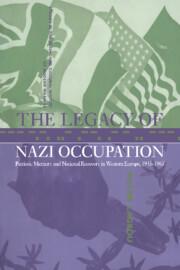Book contents
- Frontmatter
- Contents
- List of illustrations
- Acknowledgements
- List of abbreviations
- Introduction
- Part I Troublesome heroes: the post-war treatment of resistance veterans
- 1 Appropriating victory and re-establishing the state
- 2 Heroes of a nation: Belgium and France
- 3 A nation of heroes: the Netherlands
- Part II Repatriating displaced populations from Germany
- Part III The legacy of forced economic migration
- Part IV Martyrs and other victims of Nazi persecution
- Conclusion
- Bibliography
- Index
3 - A nation of heroes: the Netherlands
Published online by Cambridge University Press: 02 December 2009
- Frontmatter
- Contents
- List of illustrations
- Acknowledgements
- List of abbreviations
- Introduction
- Part I Troublesome heroes: the post-war treatment of resistance veterans
- 1 Appropriating victory and re-establishing the state
- 2 Heroes of a nation: Belgium and France
- 3 A nation of heroes: the Netherlands
- Part II Repatriating displaced populations from Germany
- Part III The legacy of forced economic migration
- Part IV Martyrs and other victims of Nazi persecution
- Conclusion
- Bibliography
- Index
Summary
During the war years the fears of the governments-in-exile had been focused on the transition, the chaotic period between the German withdrawal and the re-establishment of public order, the probably protracted period of liberation struggles when irregularities could occur and subversive forces might be tempted to seize local power. During this period, the military command would take control of the situation and share administrative responsibility with the exile governments according to ‘Civil Affairs Agreements’. Conservative resistance movements of career soldiers like the Armée Secrète in Belgium and the Ordedienst (OD) in the Netherlands had also prepared for this period, wanting to impose their own authoritarian conception of law and order, which could only increase the apprehension of the governments-in-exile. The Belgian government was spared the realisation of its worst fears by the hazards of military strategy: the invasion forces had been contained in the Normandy bottleneck from 6 June 1944 until early August, but once the German defence was broken on the Normandy front the Allies rushed forward to the next barrier, formed in the north by the great rivers in the Netherlands, which they reached in less than two months’ time. The airborne landing at Arnhem on 17 September 1944 hit a strong SS tank division and ended in costly defeat for the Allies. The offensive had to be postponed until the next spring and the logistics problem forced the Canadian troops to clear the Scheldt estuary downstream from German resistance in a slow and costly operation.
- Type
- Chapter
- Information
- The Legacy of Nazi OccupationPatriotic Memory and National Recovery in Western Europe, 1945–1965, pp. 59 - 78Publisher: Cambridge University PressPrint publication year: 1999



